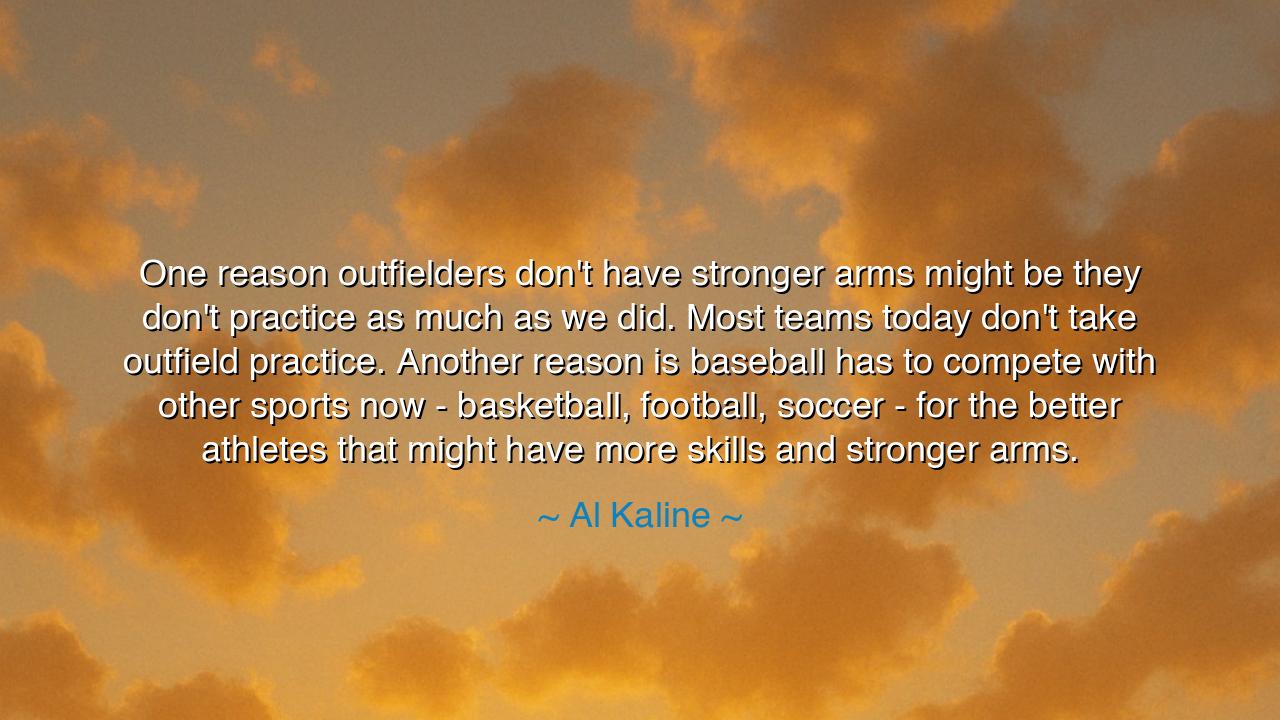
One reason outfielders don't have stronger arms might be they
One reason outfielders don't have stronger arms might be they don't practice as much as we did. Most teams today don't take outfield practice. Another reason is baseball has to compete with other sports now - basketball, football, soccer - for the better athletes that might have more skills and stronger arms.






In the ancient pursuit of greatness, those who excelled did so not by chance, but through unwavering dedication to their craft. Al Kaline, the renowned baseball legend, reflects on this truth when he says, "One reason outfielders don't have stronger arms might be they don't practice as much as we did. Most teams today don't take outfield practice. Another reason is baseball has to compete with other sports now - basketball, football, soccer - for the better athletes that might have more skills and stronger arms." These words speak to a loss of commitment, a decline in practice and discipline, and the shifting nature of sports in an ever-changing world. Kaline’s reflection reveals a timeless principle: greatness comes not from innate talent alone, but from the dedication to practice, to hone skills, and to compete with unwavering resolve.
In ancient civilizations, the greatest warriors and athletes were those who spent countless hours preparing for the challenges ahead. The Greek Olympic athletes, revered for their prowess, trained relentlessly, knowing that their physical strength and skill could only be honed through tireless practice. Their commitment to excellence was rooted in the belief that talent alone was not enough to achieve greatness—it was dedication, practice, and the will to continually improve that made them legends. Kaline’s insight into the changing nature of modern baseball echoes this ancient wisdom—without consistent practice, even the most talented athletes will not reach their fullest potential.
But Kaline’s words also touch upon a deeper truth—one that reflects the natural evolution of society and its priorities. In the ancient world, gladiators trained for battle, and chariot racers honed their skills on the tracks, not because they had no other pursuits, but because their craft demanded absolute commitment. Likewise, baseball today must compete with a multitude of other sports for the attention of the young and the best athletes. As other sports rise in prominence, the demand for practice in traditional fields like baseball decreases. This changing landscape, where baseball competes for the top talent, mirrors what the ancient civilizations experienced when new and innovative forms of entertainment began to emerge. Just as Rome’s gladiatorial games were replaced by other forms of entertainment, so too must baseball contend with the shifting tides of popular culture and emerging athletic pursuits.
The decline of focused practice in baseball, as Kaline notes, reflects a shift in priorities and a possible weakening of commitment to the fundamentals of the game. In the time of the great warrior-philosopher Socrates, there was an understanding that excellence came through constant self-reflection, rigorous practice, and pushing the limits of one’s abilities. Socrates taught that "the unexamined life is not worth living"—but the unpracticed body, the untuned skill, is also not worth much in the realm of greatness. Kaline’s observation about the lack of outfield practice speaks to the broader cultural shift toward convenience and spectacle—a society increasingly less focused on the grind of preparation and more attuned to the rewards of instant gratification and superficial success.
In this modern era, Kaline’s message holds vital significance. While we may not be athletes in the traditional sense, we too face the challenge of maintaining a high level of commitment in the face of distractions. We live in a world filled with numerous paths, all of which seem enticing and demanding in their own way—whether it be in the pursuit of career goals, personal development, or creative endeavors. Like the athletes Kaline speaks of, we too must choose whether to practice relentlessly, to hone our skills, and to focus on long-term growth, or whether to allow the distractions of the world to undermine our pursuit of excellence.
The lesson, then, is not only about baseball or athletics, but about life itself. Greatness is not handed to us on a silver platter—it is forged through constant practice, commitment, and a willingness to invest in the journey. Kaline’s lament about the lack of practice and competition with other sports reminds us that excellence requires sacrifice, focus, and the determination to put in the work when others may be distracted. Let us take this lesson to heart, knowing that the effort we put into our daily practice, whether in our craft, our relationships, or our personal growth, will determine the level of success we attain.
So, let us dedicate ourselves to consistent practice and commitment to excellence. Whether it is the skill of throwing a ball, the pursuit of a career, or the development of a creative talent, let us remember that nothing of value comes without effort. Like the warriors of old, like the great athletes who came before us, we must train tirelessly, compete with purpose, and continually seek improvement. Only then will we realize the fullness of our potential, achieving not just success, but the kind of greatness that is born of dedication and practice.






AAdministratorAdministrator
Welcome, honored guests. Please leave a comment, we will respond soon